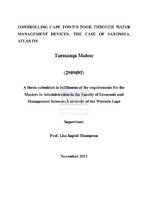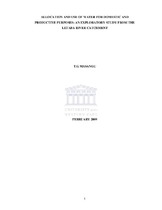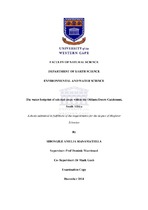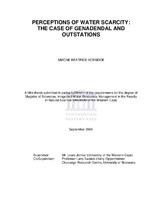| dc.contributor.advisor | Thompson, Lisa | |
| dc.contributor.author | Matose, Tamsanqa | |
| dc.date.accessioned | 2015-06-03T14:56:10Z | |
| dc.date.available | 2015-06-03T14:56:10Z | |
| dc.date.issued | 2013 | |
| dc.identifier.uri | http://hdl.handle.net/11394/4261 | |
| dc.description | Magister Administrationis - MAdmin | en_US |
| dc.description.abstract | This study examined the impact of the City’s water management strategies, specifically the water management devices, on selected households in Saxonsea. The impact of cost recovery policies on poor households was interrogated in the light of government’s distributional and procedural equity in service delivery. The main issues arising from the study were lack of consultation, inadequate information, and perception of powerlessness. The study concludes that although water management devices have contributed to significant improvements in water saving, poor households are burdened with the responsibility of saving water. If the idea is to save water across the board, this regimen should be extended to all water users and not targeted at poor households only | en_US |
| dc.language.iso | en | en_US |
| dc.publisher | University of the Western Cape | en_US |
| dc.subject | Water management devices | en_US |
| dc.subject | Water demand management | en_US |
| dc.subject | Free basic water | en_US |
| dc.subject | Human rights | en_US |
| dc.subject | Neoliberalism | en_US |
| dc.subject | Privatisation | en_US |
| dc.subject | Water Governance | en_US |
| dc.subject | Participation | en_US |
| dc.subject | Water law | en_US |
| dc.subject | South Africa | en_US |
| dc.title | Controlling Cape Town’s poor through water management devices: the case of Saxonsea, Atlantis | en_US |
| dc.type | Thesis | en_US |
| dc.rights.holder | University of the Western Cape | en_US |




